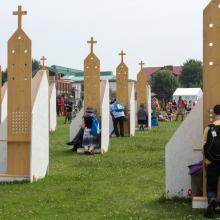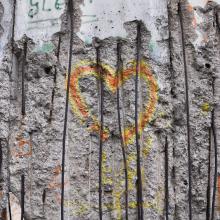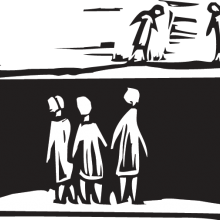division
Freedom Ride
The expanded edition of Breach of Peace: Portraits of the 1961 Mississippi Freedom Riders revisits a pivotal civil rights campaign. Filled with mugshots and recent interviews of several riders who were arrested in Jackson, Miss., Breach of Peace honors a historic act of protest. Vanderbilt University Press
One Body, Many Parts
Together at the Table: Diversity Without Division in the United Methodist Church, by Bishop Karen P. Oliveto, the UMC’s first openly LGBTQ bishop, is timely as the denomination nears a potential split over sexuality. Oliveto outlines how her denomination can remain whole. Westminster John Knox Press
Earlier this week, journalist Yamiche Alcindor asked Donald Trump about whether his rhetoric — and that of his party — emboldened white nationalists. Trump responded, "That's such a racist question." This happened on the same day in which a prominent white nationalist leader posted pictures of himself parading on the White House lawn.
Trump’s response follows a trend. When a reporter asked about his rhetoric contributing to violence, he said: “You're creating violence by your question.” When asked about the offensive ad that he ran in the lead up to the midterms, Trump replied, “Your questions are offensive.”
Until the past year, I’d never seen a religious demographic — in this case, white evangelicals — so shamelessly coupled with a partisan identity. I thought Christians were citizens of heaven, whose faith transcends political divisions with the love of Jesus. Instead, it seems we have collectively placed ourselves, or been placed, on one side of a culture war in which no one seems to be winning, but all sides are becoming increasingly suspicious, cynical, and self-protective.

Image via wjarek/Shutterstock.com
Jesus’ stories always provoke, but they also invite. This story stands as an invitation to be connected in our thanksgiving and especially in our confessing. Let the confessions begin in our homes: in the places we live, with the people we love. Let them continue in our places of worship. Let the confessions be made public such that they might reshape local and national discourse. With confidence, let us confess and receive assurance — even when we turn from God, God is faithful still.

Image via Alexandru Nika / Shutterstock.com
As the political stage gets set for the 2016 U.S. presidential election, how should Christians engage?
One unexpectedly relevant guide can be found in the book of Judges, which more than any other book in the Bible, describes a divinely-inspired form of leadership similar to our own. Between the era in which God spoke through Moses, and the one in which God worked through kings like David, came an era — lasting over four centuries — during which God raised up a series of individuals who had no predefined lineage, accomplishment, or gender marking them as leadership material. These judges were not judicial so much as military leaders, fulfilling a role strikingly similar to that of the American president.
Another notable commonality Americans share with the Israelites of Judges is the crisis in which we find ourselves. Apostasy, from the Greek word apostasia, means “an abandonment of one’s previous faith.” Then as now, a nation was turning away from God.

Photo via LoloStock / Shutterstock.com
Nearly every issue of national concern — from prison to education to tax reform, from healthcare to LGBT rights — has become so polarizing that otherwise civil, intelligent human beings often digress to the level of obdurate toddlers staring down a bowl of broccoli.
Even as we jeer at our elected officials who can’t seem to get their acts together, none who have spent any time in a church business meeting should be surprised at the level of strife and vitriol displayed in the American political arena. Seriously, it’s getting as scary as Jack Nicholson’s eyebrows out there.
If you live in any kind of an urban context you’ll likely have witnessed the following scene.
You’re at a stoplight in your car and up rolls a cyclist.
1989 was a big year for me, and for the wider world. It was the year I left my teenage years behind. It was also the year that the brutality of government repression in Tiananmen Square rocked the world, U2 came to my home town and rocked the tennis stadium for seven nights straight, and my football team went back-to-back.
But the biggest news by far that year happened in November when the Berlin Wall came tumbling down literally overnight. For 28 years the wall had separated Berliners from each other, dividing not just a nation but whole systems of government — as well as families, traumatizing them in the process.
This is all very personal for me; I have German parents who grew up during a world war that saw their country devastated both from within and without.
Today marks the 25th anniversary of that most wonderful night when people who had been divided for decades were suddenly reunited, and thousands danced on the symbolic grave of separation, celebrating the death of division. For millions of Germans, it is no doubt one of the enduring memories of their lives. For them, Nov. 9, 1989 will never be forgotten.
I can still recall watching it on TV at my mother’s home. As I was watching, I looked over at Mum and saw tears streaming down her face, unable to believe the enormity of what was happening before her eyes. Talking to my dad later, he said he thought it would never happen in his lifetime.
Last month we went to Disney World — a perpetual feast for the senses. But. For someone like me who needs to get alone for a little daily contemplation, it can be a bit overwhelming. Except for one saving grace: It's a Small World.
I was 17, I think — and much less self-aware, I know — when I first climbed aboard the jolting, jostling little boat that would carry me to "distant shores" through the rooms filled with dolls all singing the same song. There were different languages and different clothing styles. The customs represented varied as greatly as the terrain upon which they were stationed. Some sang among mountain peaks, others on desert plains. Some bundled in parkas and earmuffs, others in grass skirts and leis.
And I don't know what it was — the change in pace from the exhilarating roller-coaster-kind-of-rides or the welcome blast of air conditioning — but there was something stilling about watching all these representatives of different peoples mouthing words to the same tune. There was a deeper message in it for that ponytailed teenager. Depths that it would take me years to plumb.
A small, small world. Indeed.
*******
Days after Maya Angelou's passing, I posted a few of her beautiful words on Facebook:
"If you must look back, do so forgivingly. If you must look forward, do so prayerfully. However, the wisest thing you can do is to be present in the present ... gratefully."
Pretty amazing words, right? What could possibly be the offense in them? Within minutes a comment popped up, the gist of which was to deny the beauty and wisdom of the words for the sake of Angelou's apparently deviant beliefs about abortion (specifically, deviant according to this commenter).
Church leaders often worry that Sunday morning is the “most segregated day of the week.”
On Sundays, churchgoers gather inside congregations that are remarkably monochromatic. Whites with whites, blacks with blacks, Latinos with Latinos, Koreans with Koreans, and so on.
This phenomenon, however, is more than discomfort with diversity. It is also a search for safety. In the historic black church, for example, worshippers can assert the dignity and worth that a white society denies them. For three hours on Sunday, the need to avoid offending whites doesn’t govern their lives.
As we are learning in Ferguson, Mo., African-Americans feel unsafe — far more than many whites have realized. Young black men, for example, flinch whenever a police car passes — a vulnerability that money, job, and education can’t overcome.
In recent years, my family has navigated some rough patches: death, cancer treatments, open heart surgeries, chronic disease, etc. Now, I’m certain this isn’t everyone’s experience, but mine has been that in these times of trauma or tragedy, family comes together to stand with one another as we wrestle through life’s crap. We aren’t picking fights, we are crying on each other’s shoulders.
In recent months, our human family has been enduring an especially rough patch.
War.
Racism.
Suicide.
Deadly viruses.
Plane crashes.
Whether in remote villages or urban centers, few have been untouched (in some way) by the realities unfolding.
As I observe our corporate response to tragedy as a human family, and evaluate my own response in the midst of it, I have noticed something disturbing unfold. Rather than rally together as a family navigating a season of trauma, we have used this moment to divide, stir hatred and misunderstanding, point fingers, and more than anything, view those on the opposite side of an issue as less than human.
I was privileged to attend the ordination of a friend recently. For the first time, Michelle got to say the blessing over the bread, to break the bread and to give it to all of us with her hands.
Many tears, much joy.
As she handed me a small piece of the bigger loaf, I was reminded of how we, like the communion bread, are in the hands of others for so much of our lives. And how religion can be a thing of so much good or so much pain, depending upon whose hands it is in.
In the right hands, it’s a pathway to the divine. In the wrong hands …
It’s important that we always differentiate between religion and God. The two are distinct. God is always much bigger than any and all of our religions.
Today marks Korean-American Christian missionary Kenneth Bae’s 500th day in a North Korean prison. Bae was arrested in November 2012 while leading a tourist group. State-run media reported that he was convicted of attempting to lead a religious anti-North Korean religious coup. He has been sentenced to 15 years of hard labor. Bae is a reminder to all of us that Korea remains divided. Brothers and sisters are separated and friends are divided between the 38th parallel.
I was born in Seoul, South Korea. My mother and father were children during the Korean War, and my mother told me a few stories of how they had to flee during the war. She was a young child, one of eight. My grandmother would gather the children and walk for miles and miles making their way down into southern Korea. As they were fleeing one day, a bullet went through my grandmother’s thigh and created permanent damage to her leg. As a young child, I thought it was a wonderful war story of heroism and courage. I didn’t realize then the agony, fear, and suffering that my parents or my grandparents went through to keep safe and keep alive.
As the Korean War lingered on, it ended with the division of Korea at the 38th parallel. That division is a stark reminder of how a beautiful, lovely country can be filled with pain, sorrow, animosity, and suffering. The 38th parallel has kept family members and loved ones apart for almost 60 years. Many divided families are unable to reunite or unable to know if their relatives are still living and doing well. The heartbreak of living apart in their own country has brought lots of anger, tension, loss, and suffering.
In Korea, people have a term for such suffering: han. Han is a difficult word to translate into the English language. The best way to do so may be through ‘unjust suffering’ or ‘piercing of the heart.’
THROUGH THE WRITER of the letter to the Hebrews we will be learning this month how the spiritual environment that upholds us as agents of God’s reign is richly, magnificently peopled. Entering into the spirit of this letter is like finding oneself worshiping in a great Byzantine church, in which the walls are blazing with frescoes and mosaics depicting the history of salvation and the saints in all their glorious variety. The writer extols the lineage of witnesses to God down the ages. We are asked to recognize them all as a crowd of supporters cheering us on. The writer insists that we live in vibrant awareness of the great and all-embracing community that God is forging. “But you have come to Mount Zion and to the city of the living God, the heavenly Jerusalem, and to innumerable angels in festal gathering, and to the assembly of the firstborn who are enrolled in heaven, and to God the judge of all, and to the spirits of the righteous made perfect, and to Jesus, the mediator of a new covenant” (Hebrews 12:22-24).
This is the antithesis of the bizarre theory that “religion is what the individual does with his own solitariness,” as the philosopher Alfred North Whitehead claimed. God is communion, as we try to express it in the doctrine of the Trinity. Life is interrelatedness. The baptismal creed of the church commits us to belief in the communion of saints because God recruits us for the struggle to build, sustain, and nurture community-where-God-reigns here on earth, as it is in heaven.
Albania was perhaps the most closed society in the world during the Cold War, with absolutely ruthless persecution of all religion. Churches were destroyed in every corner of that country. Clergy were eliminated. Worship was outlawed. And enforcement was brutal.
When Communism fell, and the country opened for the first time in decades, the Albanian church began a miraculous process of rebirth. We heard the moving story of the Albania Orthodox Church, rebuilding countless church structures, but even more importantly, restoring faith in the hearts of its people. I've known its leader, Archbishop Anastasios, from past encounters at the World Council of Churches, and he surely is a saint. The revival of religious faith in Albania and its compassionate service to those in need is a magnificent story of the church's witness, and the Spirit's power.








![By U.S. Department of State from United States [Public domain], via Wikimedia Commons By U.S. Department of State from U.S., via Wikimedia Commons](https://sojo.net/sites/default/files/styles/medium_square/public/blog/Secretary_Kerry_Meets_With_the_Family_of_Kenneth_Bae_%2812194118966%29%20%281%29.jpg?itok=va8bUDtR)
